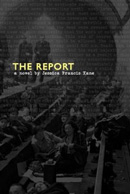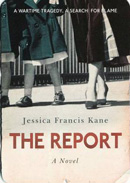


Graywolf Press (US), paperback, 9781555975654
Portobello Books (UK), paperback, 9781846272790 (March 2011)
On a cold March evening in 1943, a sad and shocking event occurred: 173 Londoners, many of them children, died in a crush of people trying to enter the Bethnal Green underground station shelter after air raid warnings had sounded. The Bethnal Green tragedy is considered the worst civilian disaster in Britain during World War II, and to this day no one really knows how it happened. Perhaps the most terrible irony is that, on that night, no bombs were dropped on London.
Jessica Francis Kane's first novel, The Report, explores the event in detail. She traces its effects on several people, both at the time and after a lapse of 30 years, when a young filmmaker working on a television documentary reopens old wounds by interviewing some of the individuals involved. Although Kane's story is fictional, it remains true to what happened at Bethnal Green as outlined in a report written shortly after the tragedy by Laurence Dunne, a magistrate charged with investigating the incident and discovering the cause. Going back and forth in time, the truth—as Kane has imagined it— becomes evident as she reveals layer after layer of each character's experiences and testimony.
The Report does indeed feature a character named Laurence Dunne, now an elderly man who is reluctant, yet strangely compelled, to relate the truth that was glossed over in his long-ago report, a secret he has carried for 30 years. The young man making the documentary film is Paul Barber, who, as the child of Bethnal Green survivors, has always been curious to learn more about the incident. Other characters include Bill Steadman, a dedicated shelter volunteer, who knows the truth but conceals it; Bertram Lodge, a town clerk whose life is haunted by the tragedy; Rev. McNeely, rector of the nearby church, who understands the reasons for secrets; Shelter Warden James Low, who blames himself needlessly; the conscientious Constable Henderson, who wonders if he could have averted the disaster if he had not stopped on his way to shelter duty to reprimand some errant boys; young mother Ada Barber, whose 4-year-old daughter died in the crush; and Tilly Barber, 8 years old at the time, who, after telling Dunne what she saw that night, has kept quiet about the incident ever since.
The public demands answers: Was the accident the result of a poorly designed shelter entrance, known to be deficient but not corrected before the accident? Could it have happened because of the darkness in the staircase—the result of a broken lightbulb smashed by someone who feared that bomber pilots above would see light from the open shelter entrance? Did the attitude of suspicion and resentment against the Jewish refugees living in the district and sharing the shelter with longtime Bethnal Green residents cause a physical conflict to break out, resulting in the fatal crush? Had some people panicked when they heard an unfamiliar sound, thinking that a new type of bomb was being deployed? Dunne grapples with all of these elements and strives to makes his report convey sympathy and understanding as well as answers. Whatever the cause, Dunne concludes that "what people want to believe is more important to them than what actually happens."
The Report is a thoughtful and moving novel that evokes the atmosphere of wartime London. The author has researched
her subject thoroughly: the narrative comes alive with the details of everyday life that Londoners endured during the war,
and the characters are true to life, drawn honestly and with compassion. Although the book tells the story of a certain group
of people, it is overall an exploration of truth and of secrets, in wartime and in its aftermath. Is it important to reveal
every detail of a catastrophe? As the wise Rev. McNeely observes: "People think they want the whole truth, but they're far
happier with only as much as they can forgive."
